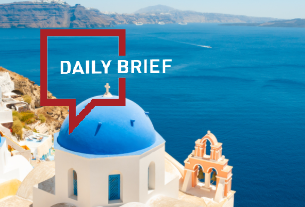It’s true that executives only mentioned Airbnb once by name during their conference call today explaining the acquisition. But each one of their main stated benefits of the tie-up happens to have the side effect of creating a more formidable opposition to the San Francisco-based startup, whose valuation is more than 5 times as high as HomeAway’s.
Executives told investors and media today that the deal would let Expedia turbocharge HomeAway’s growth by spending an enormous amount on marketing the brand, by injecting Expedia’s complementary type of inventory, by creating a fee for consumers to bankroll quality guarantees, and by helping the brand more quickly execute on its tricky transition from a classified listings site to a instantly bookable transactions platform.
Branding blitz
Expedia plans to step up HomeAway’s marketing within the next three years. That decision could be interpreted as an attempt to outgun and outmaneuver Airbnb.
HomeAway CEO Brian Sharples acknowledged at one point the larger context:
“It’s a brand game, a brand battle. There’s another company out there that gets a lot of press, a poster child of the sharing economy….
Not to give too much away to competitors, but we are planning to scale up and spend orders of magnitude more on marketing than we would today…. A much much bigger footprint that people will feel when you wake up on Sunday and watch TV.”
Launching an urban assault
Blending the inventory of the two companies, which don’t have much overlap in listings, could also position the combined brands more effectively against Airbnb.
For instance, Expedia’s vacation rental inventory and customer base is almost entirely in urban markets, said Dara Khosrowshahi, CEO of Expedia, Inc. An upcoming deal to bring on board tens of thousands of apartments in European cities will only deepen that inventory, he noted.
HomeAway’s vacation rental inventory and customers have tended to focus on resort and other far-flung areas. Out of about $14 billion in bookings transacted over HomeAway in 2015, less than $1 billion was for properties in urban markets, estimated Sharples.
While Expedia’s urban properties aren’t homestays, many of them compete directly for customers against Airbnb, which has an urban emphasis. The Expedia HomeAway combined inventory will likely have more breadth, and thus more appeal to consumers. Said Sharples:
“Long-term, even people in urban markets are going to have to participate in this channel because we’ll have made it too big for people who are in this business to ignore.”
On this point, Sharples acknowledged that some investors had worried about Airbnb’s superior positioning in urban markets.
“Something that has held our stock back a little is people looking at these urban markets. People ask, ‘What is HomeAway going to do there? Do they have the resources to do something there?’
Certainly in urban markets we now have … Expedia’s platform that has top demand in that area…. Together we’re going to try to find a sweet spot there. It may not be exactly competitive with some of the other models out there involving inventory we don’t like. But we think there’s a huge opportunity in urban areas with the inventory we do like.”
Targeting a “more profitable” segment
HomeAway focuses on second homes that are full-time for rental, unlike Airbnb, which still does a huge business in primary residences being turned out for rental. Sharples said he liked that:
“We’re not really in the homestay market today…. Job number one is to really really build the biggest business we can in the vacation rental market with the kind of inventory we’ve had….”
Sharples estimated HomeAway only has about 15% of the potential global transaction volume of second home inventory, with homestay being a separate category of business outside of that. He then dismissed the homestay model.
“There is a big segment of homestays that is probably not a very profitable business to be in because the average room night revenue is so low when you compare it with the average cost to acquire a customer…. The biggest company in that business doesn’t make money in that yet. They may. But we’re going to try to focus on the profitable stuff.”
Marketing itself as more trustworthy
Another of today’s announcements could be seen as a move to help the Texas-headquartered HomeAway bolster its position vis-a-vis California-based Airbnb.
Starting by June of 2016, HomeAway will roll out for the first time a fee for consumers who book stays through its collection of brands, starting with US customers.
The fee will only be added where there is online checkout, and 44% of the company’s transactions still aren’t online yet — though the goal is for them all to be online by the 2016.
Customers paying the “traveler service fee” will be promised “a higher level of guarantee and trust products,” said Sharples, who was vague on details. But he inferred that the context was to
The fee will be on a sliding scale and average of about 6% average of most transactions. A fee at that typical rate would lower than what its major competitors, such as Airbnb, charge consumers.
But tying that fee into an added assurance of protection against fraud is also part of an effort to undermine Airbnb, which it wants to imply has flakier owners and more inconsistent quality control in its inventory.
Another perk of the fee will be that HomeAway will be able to lower the commissions and subscriptions it charges its suppliers, making its offer more competitively priced for property owners choosing platforms to list on. Sharples says that, in testing, the fee did not reduce bookings.
The company also aims to improve its monetization relative to its competitors. It’s only at just above 3% compared to about 12% for Airbnb and TripAdvisor (owner of FlipKey).
HomeAway’s goal is to get to about 8% to 10% range, letting it stay more attractive in suppliers’ eyes than Airbnb and other rivals while still tripling its revenue from today’s level.
Speeding up a difficult transition
The last main reason why this tie-up strengthens both parties to vie with Airbnb is the expertise that Expedia can provide HomeAway’s management in negotiating a transition in business model and in optimizing for greater conversion.
The implication here — not spelled out by the executives — is that if HomeAway stumbled in its execution, Airbnb might gain an insurmountable lead in momentum.
Noted Sharples:
“It creates more certainty on the execution front [as we transition from a listings model to a transaction model]. There is competition in this business, and conversion expertise is essential…
“We know there will be some owners who don’t like the changes. We know the most important thing to owners and keep them happy is to deliver them more revenue and more bookings.
So we are going to be able to make these changes under the air cover of a greatly expanded distribution network with Expedia. In the end, suppliers are going to find that… there’s no other platform they can get as many bookings and revenue….”
Skeptics may wonder if there is still an execution risk because Expedia may be too busy having to digest its other recent acquisitions — Orbitz, Travelocity, and Wotif — to be able to give HomeAway proper attention.
Khosrowshahi waved away this concern:
“Orbitz is the third integration our team has embarked on. The teams now know how to do this…. We feel good about where we are on the Orbitz integration… We look at HomeAway a bit differently. HomeAway is not going to be a heavy integration….
“The value we see is that HomeAway is moving through a transition from a classified listings-based model to primarily a transaction-based model, and we think we can add a lot of value there because, [at Expedia Inc ourselves], we’ve spent the past five or six years optimizing the transaction process for conversion growth leading to be the ability to boost variable marketing and combine that with better customer experience, adding up to a really good formula….
“To some extent we see HomeAway at where we were in year two of our journey, of where we were three or four years ago.
“We have a saying at our company: ‘In the end, math wins.’
“In this deal, we think it’s on our side.”
Read original article




